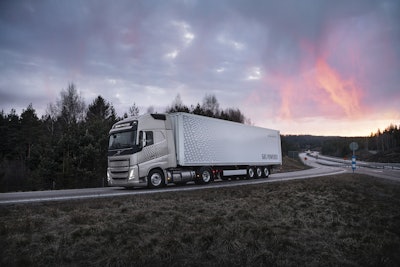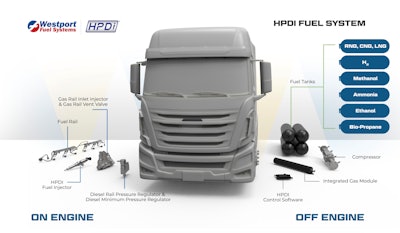
Volvo Group and Westport announced a partnership to accelerate the commercialization and global adoption of Westport’s High Pressure Direct Injection fuel system technology for long-haul and offroad applications.
Westport reports that its HPDI fuel system is a high-performance solution that can convert diesel engines into accepting alternative fuels that can significantly reduce carbon in hard-to-abate sectors like heavy-duty trucking and off-road mobility.
Westport goes on to say that HPDI enables equipment manufacturers to meet the challenging regulatory requirements of the U.S. EPA and Euro 7 while offering end users affordable options that are powered by carbon-neutral fuels like biogas, zero-carbon fuels like green hydrogen and other renewable fuels.
While Volvo will be a key customer of the joint venture, the joint venture’s mandate will be to enhance commercialization of HPDI through the addition of new trucking and equipment manufacturers as customers.
Westport will contribute current HPDI assets and activities including related fixed assets, intellectual property, and business into the non-binding, joint venture. Volvo will acquire a 45% interest in the joint venture for the sum of approximately U.S. $28 million
(approximately SEK 300 million), plus up to an additional U.S. $45 million (approximately SEK 500 million) depending on the performance of the venture.
Volvo’s aims to reach net-zero greenhouse gas emission-enabled products, solutions, and services by 2040. The Swedish based company believes that the future will demand diverse propulsion solutions for diverse applications to meet customers’ needs and environmental demands. Volvo advocates for a three-pronged approach: battery electric, fuel-cell electric and internal combustion engines.
“Decarbonization with internal combustion engines running on renewable fuels, especially with HPDI, plays an important part in sustainable solutions,” said Lars Stenqvist, chief technology officer of Volvo.
“HPDI has been on the road in Volvo trucks for over five years and is a proven technology that allows customers to significantly reduce CO2 emissions in LBG (liquefied biogas) applications here and now and is a potential avenue for hydrogen.”
The HPDI fuel system consists of a fully integrated tank-to-tip solution based on diesel technology. At the heart of the engine is a revolutionary patented injector with a dual concentric needle design. A small amount of pilot fuel (which can be diesel fuel or a biodiesel renewable fuel) is injected into the cylinder prior to the gas to initiate the ignition.
Engines can achieve higher horsepower and torque by using direct injection and relying on high pressures in the combustion chamber for ignition. According to Westport, the characteristic of the engine using an HPDI fuel system is very similar to a diesel engine “with no compromise on vehicle performance.”
Designed for heavy long-haul and distribution operations as well as off-road applications like mining, rail, and marine, HPDI fuel systems offer an alternative with low climate impact while meeting the highest industry standards for performance, fuel efficiency, and operating range required for heavy-duty transport.









